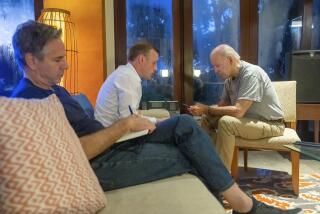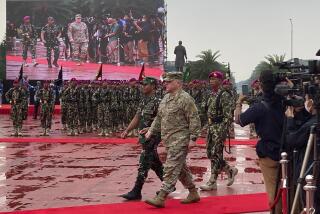U.S. Warns Indonesia to Curb Violent Gangs
- Share via
JAKARTA, Indonesia — U.S. Defense Secretary William S. Cohen urged Indonesia on Monday to take quick action to disarm and disband militia gangs in West Timor or face isolation by the international community.
After meeting with President Abdurrahman Wahid and other top officials, Cohen said Indonesia must prove by its actions that it will combat the ruthless paramilitary gangs responsible for killing three U.N. workers, including an American, earlier this month.
“Indonesia faces a momentous decision: whether to build a fair, just society under the rule of law or to allow unpunished violence to explode the dream of democracy, stability, unity and prosperity,” the secretary said.
A series of politically targeted killings and bombings has heightened instability in the vast island nation and made it apparent that Wahid, a frail Muslim cleric, has little control over the military or its alter ego, the militias.
Many Indonesians fear that elements within the military and supporters of ousted dictator Suharto are mounting a campaign of violence--including the slaying of the U.N. aid workers--in a bid to undermine Wahid and return to power.
After the three United Nations staffers were hacked to death by militia members Sept. 6, the U.N. Security Council passed a resolution insisting that Indonesia disband the militias and arrest and prosecute those who carried out the killings.
So far, Indonesia has made no progress in bringing the gangs to heel or in arresting the culprits.
In comments that startled and angered Western diplomats last week, Wahid’s new defense minister, Mohammad Mahfud, suggested that the U.N. workers were killed in a plot masterminded by Australian spies. Indonesian officials also said they would not meet with a U.N. Security Council delegation scheduled to visit Indonesia to discuss implementation of the resolution.
Cohen, who arrived in Indonesia on Sunday, said he had been asked by President Clinton to highlight the issue of Indonesia’s “disappointing response” to the slayings.
Failure to rein in the militias, he said, “could jeopardize continued economic assistance to Indonesia.” The government in Jakarta, the Indonesian capital, has received many billions of dollars in aid from international lenders and is counting on continued financial help.
The issue for Wahid is not whether he wants to control the militias, it is whether he can.
Under Suharto, the military was primarily a tool for controlling the civilian population and was known for its brutality. Last year, the army created militias in East Timor to intimidate the population into voting against independence in a U.N.-sponsored ballot. When the populace voted to secede from Indonesia anyway, the militias massacred hundreds of people and razed much of the province.
The militia members fled from U.N. peacekeeping troops to West Timor, where they have lived under the protection of the Indonesian army in camps alongside hundreds of thousands of refugees. Indonesia has not convicted anyone in the East Timor killings.
The United States cut off military cooperation with Indonesia last year after the militias ran amok in East Timor, and Cohen said it will not be reinstated until Indonesia demonstrates a firm commitment to dealing with the militias.
Many suspect that the military played a part in last week’s car bombing of the Jakarta Stock Exchange, which killed 15 people. The blast, which was caused by military-style plastic explosives, was widely interpreted as a warning to the government not to proceed with the corruption trial of Suharto, now 79 and in poor health.
On Monday, Wahid fired the chief of the national police, Gen. Rusdihardjo, and appointed his deputy, Bimantoro, to be acting chief. (Like many Indonesians, both go by only one name.)
It was unclear whether Wahid fired the chief because of his failure to prevent the recent spate of bombings or whether the president was angry that police released Suharto’s youngest son, Hutomo Mandala Putra, after questioning him Saturday.
Wahid had ordered the arrest of Hutomo, commonly known as Tommy, charging that he was behind the attacks. The president did not explain his reasons for firing Rusdihardjo, except to say, “Because of the security situation, we need a replacement.”
Investors, already uncertain about prospects for Indonesia’s economic recovery, were severely rattled by last week’s stock exchange bombing. On Monday, the first day the Jakarta Stock Exchange had been open since the blast, its index plunged 7% to its lowest level since spring of 1999.
More to Read
Sign up for Essential California
The most important California stories and recommendations in your inbox every morning.
You may occasionally receive promotional content from the Los Angeles Times.













